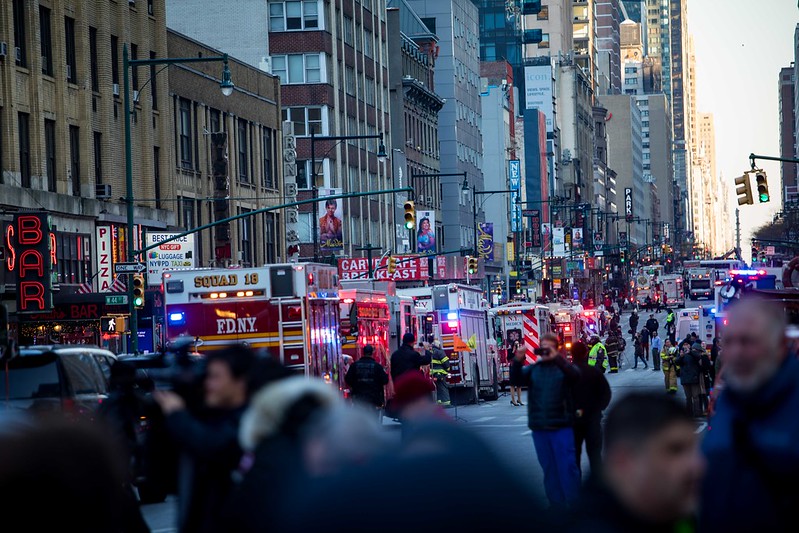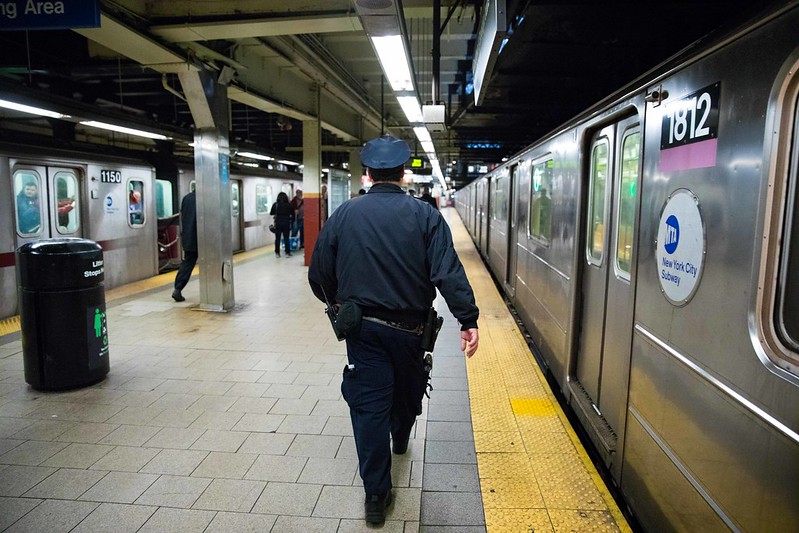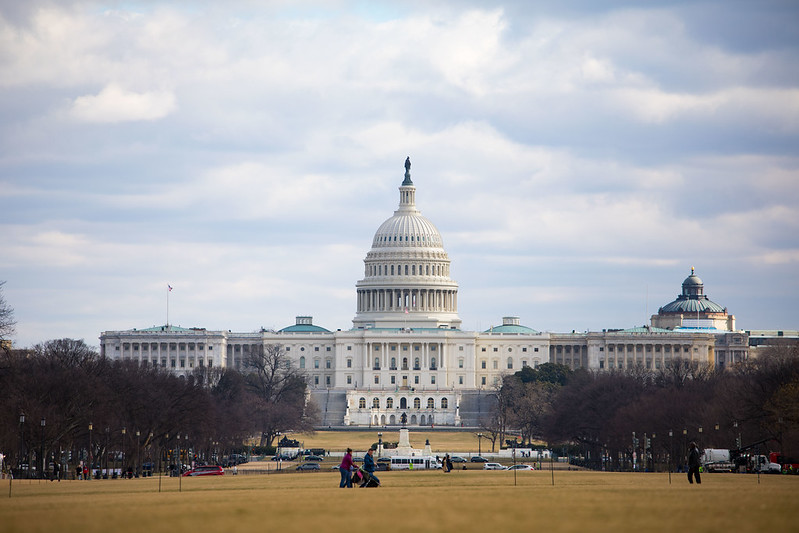Coronavirus, Criminal Justice and Civil Liberties

(photo: Benjamin Kanter/Mayoral Photo Office)
While New York’s public health system is doing its best to combat the coronavirus, we need far more assurance from elected officials, especially those involved in our criminal justice system, that they are ready to protect our civil liberties in this emergency. As a civil rights attorney, I know that we must meet this moment with a response that honors public safety, protection from discrimination and price-gouging, civil liberties, and regard for those most marginalized, including people in our jails. We cannot sacrifice our basic values in the name of emergency.
Public health is a matter of public safety, and that is why we must give our health officials the resources they need to fight the coronavirus. But too often in these emergencies, marginalized communities are left behind, whether they are people in NYCHA public housing, homeless shelters, or jails and prisons. This health crisis is also a justice issue.
We must protect vulnerable populations in jail and prison, which are dangerous breeding grounds for a disease like the coronavirus. People are held in close quarters in unsanitary conditions, with medical facilities that are strained under normal circumstances. There is reason to believe a local federal facility is already experiencing issues.
We should explore “medical furloughs” for elderly people being held in our jails and prisons to be removed during the pendency of the outbreak if they have safe places to live in the community. Elderly people in prison with active clemency applications should have those expedited and approved when appropriate. Likewise, we should impose a moratorium on jailing technical parole violators. These individuals, who have broken parole rules (rather than the law), pose virtually no public safety risk, and now is not a good time to crowd jails with them. Consider that Iran has released more than 54,000 people from its prisons to slow the spread of the disease.
We must defend civil liberties, which are always tested in times of crisis. On Monday night, Governor Cuomo pushed through legislation that would confer upon him extraordinary powers to suspend laws and enact new measures to respond to not only this emergency, but events as vague as “storms.” The New York Civil Liberties Union and progressive leaders like State Senator Gustavo Rivera correctly criticized the reckless manner in which this sweeping law was passed. And within our city, should the spread of the virus worsen, we must be very careful about not implementing restrictions on movement that will actually make it harder to fight the disease - such as shutting down forms of transit used by our healthcare workers. On this we can learn from the South Koreans in Daegu, who have promoted transparency and made few impositions on liberty even under a much more severe outbreak.
We must combat price-gouging, especially as hand sanitizer and other products become harder to come by. There is already a law against price-gouging during an emergency, and Senator Brad Hoylman has introduced good legislation that would strengthen it. The law empowers the New York Attorney General to fine culprits, but that will only deter companies if they think they’ll be held accountable. That’s why the city’s District Attorneys and other relevant agencies such as the New York City Department of Consumer Affairs should publicize easy ways to report price-gouging.
We must be vigilant against discrimination. We should follow the lead of Assemblymember Yuh-line Niou and denounce media depictions that promote anti-Asian sentiment. Likewise, we must reject the Trump administration’s castigation of Iranians, Mexicans, and other groups this administration will “other” during the outbreak. If that sounds obvious, remember our city is less than a decade removed from succumbing to right-wing Islamophobia during the “Ground Zero Mosque” controversy, when two-thirds of New Yorkers opposed building a Muslim community center. Should tensions rise, we must be unequivocal: we will not allow discrimination to flourish. This is a global crisis, we are all in this together.
This is a serious moment for our city, and some of our leaders are nowhere to be found. Implementing the right health response will require steady leadership, robust coordination, and aggressive outreach from our government. By honoring values like civil liberty, thinking creatively, and protecting marginalized communities rather than succumbing to fear, New York City can show national leadership in its response, and prove itself ready for more 21st century challenges ahead.
***
Janos Marton is an attorney and a 2021 candidate for Manhattan District Attorney. On Twitter @janosmarton.
***
Have an op-ed idea or submission for Gotham Gazette? Email This email address is being protected from spambots. You need JavaScript enabled to view it.
Fare Evasion Shouldn’t Be a Crime; Neither Should Putting Your Feet Up on the Subway

Policing the subways (photo: Benjamin Kanter/Mayoral Photo Office)
If you’ve ridden the subway recently, you could be forgiven for feeling watched. The MTA’s fare evasion crackdown is ubiquitous; subway cars are plastered with phrases like “We’d rather your $2.75 fare than your $100 fine.” Governor Cuomo’s surge of 500 NYPD and MTA cops has increased police presence in the transit system noticeably. In response, hundreds of people protested in January in Grand Central station, activists jumped turnstiles en masse, and New Yorkers are using social media to alert fellow riders to police presence in subway stations.
The crackdown should concern New Yorkers, because fare evasion enforcement is highly disproportionate. According to the most recent NYPD data, 92% of the 481 fare evasion arrests in the fourth quarter of 2019 were of non-white riders; 60% were black. Data like that led New York Attorney General Letitia James to announce a probe of racial disparities in fare evasion stops. For all this, the MTA is projected to lose money, spending $249M on new officers to recover $200M in fares, though the cops are also said to be for other purposes, like combatting robbery and assault, including on transit workers.
While the fare evasion crackdown is now familiar to straphangers, what might surprise some New Yorkers is that it isn’t just jumping the turnstile or committing more serious crimes that can get you arrested on the subway. Under New York state law, violating the MTA rules of conduct is punishable by up to 10 days imprisonment. As the New York Times has reported, this means that putting your feet up on a seat could land you in jail.
Other offenses include carrying open liquids, walking between train cars, playing music on a stereo, or carrying an animal outside of a container. Getting arrested for taking up an extra seat is probably not something most subway riders worry about, but the infrequent use of these laws does not lessen their serious consequences. For immigrants, a police encounter on the subway could be a first step toward deportation.
Fortunately, there are other ways to protect the transit system’s revenue stream and promote orderly conduct without jeopardizing the personal liberty of riders. In Washington, D.C., the city council voted to decriminalize fare evasion, overriding the mayor’s veto. That does not mean that jumping the fare gate in the capital no longer carries any consequences. Rather, fare evaders are subject to a civil fine of up to $50. What got less attention is that D.C.’s reform also decriminalized smoking, eating, littering, playing music, carrying animals, and more on the Metro. Those offenses too are punishable by a $50 fine. Another model New York could adopt is that of Portland, Oregon, where fare evaders are now granted 90 days to resolve their cases out of court.
Law enforcement in New York City has recognized that fare evasion prosecutions do not advance public safety. In 2017, Manhattan District Attorney Cy Vance announced that he would not prosecute subway fare evasion, unless there is a “demonstrated public safety reason to do so.” That is a good step, which recognizes that public safety resources are best prioritized on other matters. However, it leaves the door open to arbitrary enforcement, still requires offenders to participate in a diversion program, and widens enforcement disparities with the outer boroughs. It also calls into question the rationale for continued fare evasion arrests at all.
Legislators in Albany should follow the lead of these other jurisdictions, and repeal criminal penalties for both fare evasion and violating the MTA rules of conduct. This would not be an invitation to bad behavior, but it would make the punishment for these offenses far more proportionate. New York City has already had great success with this approach in other areas. Under the city’s Criminal Justice Reform Act of 2016, offenses like public urination, carrying open containers of alcohol, violating park rules, littering, and making excessive noise now carry civil, rather than criminal, penalties in most cases. That change resulted in tens of thousands of fewer criminal summonses being issued, and over 644,000 outstanding arrest warrants being dismissed.
If we want to meaningfully reduce mass incarceration, and make our society less punitive, we must not think of the criminal law and incarceration as the only tools to enforce rules. Decriminalizing public order offenses on the transit system would be an important step in that direction. Being poor should not be a crime, either. Fixing the subway cannot just be about improving arrival times, it must also include doing justice for all New Yorkers who rely on it.
***
Sam Rubinstein is a law student at the University of Michigan. On Twitter @Sam_Rubinstein.
***
Have an op-ed idea or submission for Gotham Gazette? Email This email address is being protected from spambots. You need JavaScript enabled to view it.
To Have Truly People-Powered Campaigns, We Need Democracy Vouchers

(photo: Benjamin Kanter/Mayoral Photo Office)
We’re just a few months into 2020, and it has been the focus for much of the country for months, if not years, and for good reason -- it is the most important election our democracy has faced in decades. While voter turnout is projected to be record-breaking this year, one of the greatest inequalities of our democracy still needs serious legislative reform: campaign finance.
In 2016, 15% of Americans reported making a political donation, but only 0.52% of the population controlled 67.8% of the total political donations by donating at least $200. Two years later, in 2018, the numbers were worse: 0.47% of the population contributed at least $200 to a campaign, but totaled 71% of all political donations.
Up and down the ballot, more and more candidates are making voluntary pledges to reject corporate PAC money and donations from special interest groups. Several Democratic presidential primary candidates are breaking records with their number of small-dollar donors. But these are voluntary pledges and candidates down the ballot will never be able to match the energy surrounding a presidential campaign.
Although we come from different backgrounds, we have both worked to serve our communities and have run for office against machine-backed candidates. As we can both attest, raising enough money to take on the establishment is hard and we have seen firsthand the impact of corporate money in campaigns -- and the power in the movement to remove special interest money from politics altogether.
It will take legislative change to elevate the value of small-dollar donors and fully get special interest money out of politics.
The most exciting idea, a proposal with potentially transformative effects, is Democracy Vouchers at the federal level. Democracy Vouchers are a simple concept - jurisdictions grant voters vouchers of a select dollar amount that they can donate to the candidates of their choice, as long as the candidates vow to meet certain contribution limits.
For example, every voter in America could get $50 under legislation proposed by Rep. Ro Khanna. They could only use that $50 on federal elections. People know that money matters in campaigns, and because of that, they feel (more) shut out.
Democracy Vouchers have proven to be effective — Seattle voted to implement Democracy Vouchers in 2015 and then piloted its program in 2017. The initial impact of the voucher program included doubling the percentage of giving coming from people under the age of 25 and an increase in people of color making donations. The time for Democracy Vouchers to be more widely implemented has come.
Their ability to empower people to become further engaged in the political process is tremendously important, especially in low-income areas. For too long, candidates, especially challengers, running in low-income areas have had to fundraise outside their communities to run viable campaigns — necessarily giving outsiders the power to decide what matters most and protecting incumbents. Democracy Vouchers would serve as an equalizer for all donors and create greater opportunity for low-income communities to donate to the candidates they believe in.
If we are going to continue the progress we made in 2018 to create the most diverse Congress in history, we must find ways to level the playing field so that more candidates, including women and people of color, are empowered to run. If we are truly going to rid special interests from politics, we must institute public campaign financing through Democracy Vouchers at the federal level and hold leaders accountable for letting corporations -- not people -- dictate their leadership.
***
Adem Bunkedekko is a candidate for Congress in New York’s 9th District, covering parts of Brooklyn. Zephyr Teachout is a law professor. On Twitter @ZephyrTeachout & @adembunkeddeko.
***
Have an op-ed idea or submission for Gotham Gazette? Email This email address is being protected from spambots. You need JavaScript enabled to view it.




